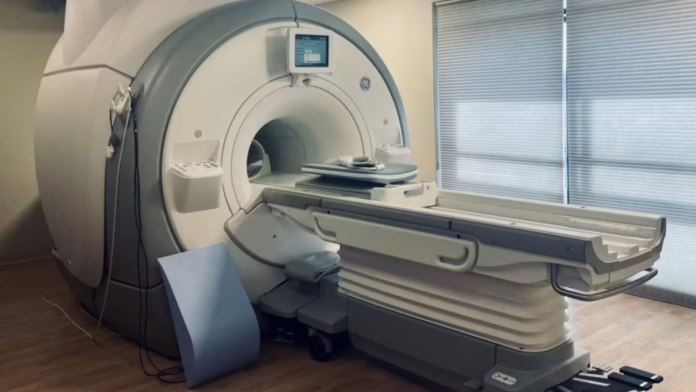In a groundbreaking initiative, Paras Defence & Space Technologies Limited , a leading Indian defence engineering company specializing in advanced Optronic Systems, Defence Electronics, and Electromagnetic Solutions 1, has announced its pivotal role in developing India’s first indigenous Magnetic Resonance Imaging (MRI) machine . This project, spearheaded by the Society for Applied Microwave Electronics Engineering and Research (SAMEER) —an autonomous R&D institution under the Ministry of Electronics and Information Technology (MEITY)—marks a significant milestone in India’s quest for technological sovereignty in high-end medical imaging.
The initiative aims to reduce India’s import dependency on MRI machines and their components, making advanced diagnostics more accessible and affordable for millions of patients. By leveraging its expertise in precision engineering, electromagnetics, and advanced materials, Paras Defence is set to manufacture high-performance MRI-grade magnets , a critical component that forms the core of MRI machines.
Breaking New Ground in Medical Technology

Munjal Shah, Managing Director of Paras Defence , expressed pride in contributing to this historic initiative:
“At Paras Defence, we are honored to play a key role in redefining India’s capabilities in medical technology. By developing and manufacturing the critical magnets for India’s first indigenous MRI machines, we are not only reducing import dependence but also driving technological innovation that makes high-quality diagnostics more accessible. This project positions India as a global leader in advanced medical imaging. We look forward to collaborating with SAMEER and our industry partners to drive this vision forward.”
The collaboration places Paras Defence among a select group of global companies capable of manufacturing MRI-grade magnets, showcasing India’s growing expertise in high-tech medical devices.
Advanced Engineering for Global Standards
The magnets —one of the most complex and expensive components in MRI machines—will be manufactured at Paras Defence’s Ambernath facility , with production scheduled to begin in the next financial year. The company will employ advanced electromagnetic, cryogenic, and superconducting technologies to ensure these magnets meet global imaging quality and efficiency standards.
Co-developed in consultation with the Inter-University Accelerator Centre (IUAC) and international experts, the magnet technology aligns with global performance benchmarks, ensuring reliability and precision in medical diagnostics.
India’s Vision for Technological Sovereignty
Dr. P. Hanumantha Rao, Director General of SAMEER , highlighted the significance of this initiative:
“This consortium, led by SAMEER and supported by MEITY, exemplifies the Honorable Prime Minister’s vision of making India self-reliant with homegrown technologies. By democratizing R&D outputs into manufacturing, we are significantly reducing the cost of medical equipment and diagnostics, benefiting both healthcare providers and patients.”
The first indigenous 1.5 Tesla MRI scanner is slated for installation at AIIMS New Delhi by October 2025 for clinical evaluation and trials. This development is expected to bring down procurement costs by 30% , easing the financial burden on hospitals, diagnostic centers, and patients.
Market Impact and Growth Opportunities
The global MRI market, valued at USD 6.64 billion in 2023 , is projected to grow at a CAGR of 6.5% . Meanwhile, India’s MRI market is estimated at USD 326.85 million in 2025 and is expected to reach USD 439.67 million by 2030 , growing at a CAGR of 6.11%. By indigenizing MRI machine production, India aims to stimulate growth in its medical devices industry, attract investments in advanced healthcare infrastructure, and position itself as a global hub for cutting-edge medical technology.
This initiative is also expected to generate new jobs in India’s medical devices sector, spanning R&D, high-tech manufacturing, and assembly. It represents a bold step toward building domestic expertise and fostering innovation in medical imaging.
A New Era of Medical Manufacturing
For Paras Defence , this marks the company’s first foray into medical technology manufacturing. Starting with one of the most advanced and critical components in diagnostic imaging, the company aims to become a domestic supplier for MRI magnets while exploring opportunities to export globally. This expansion underscores Paras Defence’s commitment to diversifying its portfolio and contributing to India’s broader vision of technological self-reliance.
By building domestic capabilities in MRI manufacturing, this initiative will not only enhance accessibility to advanced diagnostics but also establish India as a competitive player in the global medical technology landscape.
Why This Initiative Matters
- Self-Reliance in Medical Technology : Reducing import dependency on MRI machines and components.
- Affordable Healthcare : Lowering procurement costs by 30%, making diagnostics more accessible.
- Global Leadership : Positioning India as a hub for advanced medical imaging and technology.
- Job Creation : Generating employment opportunities in R&D, manufacturing, and assembly.
For more information about Paras Defence & Space Technologies , visit their official website or follow updates from the Ministry of Electronics and Information Technology (MEITY) .
Key Takeaways:
- Paras Defence is developing India’s first indigenous MRI machine, focusing on advanced magnets.
- The initiative reduces import dependency, making diagnostics more affordable and accessible.
- Production will begin at Paras Defence’s Ambernath facility using cutting-edge technologies.
- India’s MRI market is projected to grow at a CAGR of 6.11%, reaching USD 439.67 million by 2030.
- The project fosters technological self-reliance and positions India as a global leader in medical imaging
Image Source: google.com

